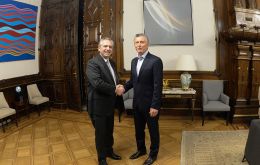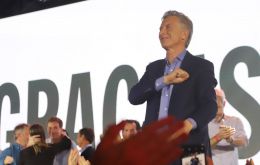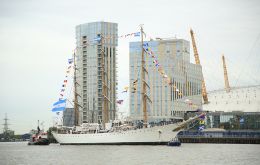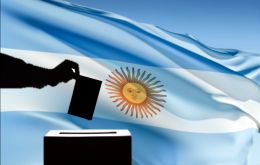MercoPress. South Atlantic News Agency
Argentina
-
Tuesday, October 29th 2019 - 09:59 UTC
Macri and Fernandez agree to start an orderly transition ensuring “dollars and social peace”

Argentine president Mauricio Macri and president-elect Alberto Fernandez met on Monday midmorning at Government House, Casa Rosada, to discuss terms for an orderly transition until next 10 December when the new government takes office, plus exchange names of the two teams that will be involved in the discussions.
-
Tuesday, October 29th 2019 - 09:55 UTC
Alberto Fernandez and Bolsonaro on collision course over Lula and Mercosur

Argentine elected president Alberto Fernandez on Sunday called for ex-president Lula da Silva to be freed from prison, which most certainly puts him on a collision course with Brazil's Jair Bolsonaro.
-
Tuesday, October 29th 2019 - 07:29 UTC
IMF and US congratulate president elect Fernandez

International Monetary Fund chief Kristalina Georgieva on Monday congratulated Alberto Fernandez, winner of Argentina's presidential elections, and vowed to work with his government to stabilize the economy.
-
Monday, October 28th 2019 - 16:57 UTC
Bolsonaro hints Argentine might need to leave Mercosur

Brazil's President Jair Bolsonaro said late Sunday upon departing from Abu Dhabi after a two-day state visit that if the policies of Argentina's next president affect Mercosur's agreement with the European Union (EU), a solution may be to remove the southern neighbours from the bloc.
-
Monday, October 28th 2019 - 09:59 UTC
Transition in Argentina: Macri invites Alberto Fernandez to breakfast Monday morning at Government House

Argentine President Mauricio Macri conceded defeat in Sunday's presidential election, congratulating rival Alberto Fernandez on winning the election.
-
Monday, October 28th 2019 - 09:55 UTC
President Macri defeated but confirmed as the next leader of the opposition

Argentine President Mauricio Macri's performance this Sunday following the trashing defeat he suffered last August during the PASO primaries (48% to 32%), was in effect quite surprising. He managed to recover eight points and cut the difference from 16 to eight points, 48% to 41%, besides winning in the main electoral districts of Argentina except for the always decisive Buenos Aires province.
-
Saturday, October 26th 2019 - 09:50 UTC
Argentina: calls for a rational transition starting O-28 and the pancake syndrome

On Sunday 33.8 million Argentines will vote for a president, for the renewal of the 130 members of the Lower House and a third of the Senate, 24 out of 72. But results should come as no surprise since a majority of the Argentine electorate has zapped to an old déjà vu show, fed up with president Mauricio Macri and his pro-business policies.
-
Saturday, October 26th 2019 - 09:30 UTC
Londoners can visit Argentina's training vessel ARA Libertad this week end

Argentina's Navy training tall vessel ARA Libertad on her 48th voyage docked on Thursday in London, where she was received by the Argentine Ambassador to the United Kingdom, Carlos Sersale, representatives of the Royal Navy and members of the Argentine community in UK.
-
Friday, October 25th 2019 - 09:58 UTC
Argentine ready for the return of Kirchnerism defeated by Macri in 2015

Argentines head to the polls on Sunday with the Peronist opposition strong favourites to take back the presidency from business-friendly reformer Mauricio Macri, who has been stung by a tumbling economy and financial crises.
-
Friday, October 25th 2019 - 09:52 UTC
Fitch says Argentina's weak credit fundamentals limit debt exchange scope: suggests a “haircut”

Rating agency Fitch said on Thursday that Argentina’s weak credit fundamentals, in terms of both liquidity and solvency, limit the scope for a debt exchange that minimizes losses for investors beyond maturity extensions.
